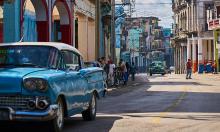Humanitarian catastrophe in Darfur
 Ethnic cleansing invokes memories of Rwanda.
Ethnic cleansing invokes memories of Rwanda.
Not only are there 750,000 people internally dislocated in the Darfur region of Southern Sudan, outside the reach of the authorities and relief agencies, there is also a systemic policy of ethnic cleansing, comparable to the genocide in Rwanda in 1994.

The situation in the region has worsened since last week, when Pravda.Ru printed a report on the plight of 750,000 internally dislocated persons in the region, trapped by fighting among the Sudanese Armed Forces and local militia supported by these to displace the non-Arab population from the area.
Not only is this a guerrilla war, the policy is tantamount to ethnic cleansing on a huge scale. The government-backed militia Janjaweed, Muraheleen and Popular Defence Forces are fighting against the Dajo, Masalit, Tama, Tanjur and Zaghawa tribes, which make up the Fur ethnic group.
United Nations officials are "gravely concerned" after investigating cases of torture, summary executions, gang rapes of women and girls, kidnappings, robbery, looting, arson and denial of food. The 750,000 people caught in the area have no way to escape and the humanitarian agencies have no way to reach them.
The UN released a report today on how much the situation has worsened in the last week: there are grave water shortages and disease has broken out among the trapped refugees. Attacks against civilians are taking place on a constant, widespread and daily basis, according to the report, forcing the
internally displaced population to crowd together in the region's towns, compounding the problem.
In recent decades, the delicate ethnic mix which makes up Sudan has been strained by external influences, the tribes in Islamic North and the Christian South being armed and funded to create the conditions for local warlords and their foreign masters to gain more power. Sudan, with nearly 600 ethnic groups and 400 languages, has the perfect conditions for chaos
Since the 1940s, the Arabic North of the country has been concentrating power in Khartoum and denying more and more rights to the African South.
Before the country's independence from the British in 1956, there was a civil war, which continued intermittently until 1972, when the SSLM (Southern Sudan Liberation Movement) signed a peace agreement with President Nimery.
However, the policy to implant Arabic culture and language on the peoples of the South has continued to create ethnic tension since then, tension which was compounded by the discovery of oil in Southern Sudan in the 1970s, which gave rise to an independence movement in the region.
Trying to restore order so as to benefit from the revenue from these resources, Nimery declared Sharia Law in September 1983, constituting a violation of the agreement he had signed with the SSLM, which regrouped under a new name, the SPLA (Sudan People's Liberation Army).
In 1986, Nimery was forced out of power in a coup d'etat and three years of weak government by a coalition was ended by a further coup in 1989 by General Omar al-Bashir, the leader of the National Islamic Front, a fundamentalist and nationalist, pro-Islamic and anti-African group. During the 1990s, various political organizations in Northern Sudan allied with other forces in the South, which in turn saw a division of the rebel forces into different factions. However, the SPLA remained, and remains, as a force which protects the identity and culture of the peoples in the region but also defends a movement towards independence, which would deprive Khartoum of its resources.
Subscribe to Pravda.Ru Telegram channel, Facebook, RSS!





